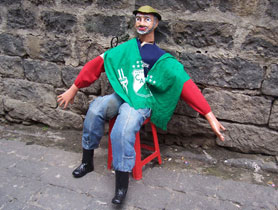December 3, 2013
Ushering Out the Old Year
Nota - Este artículo es disponible en español aquí.
 In the small towns around Cali, the city in Colombia where I was born and grew up, at about this time, children start getting ready to make the “Año Viejo”—an effigy of the old year. Someone in the village will donate a suit, the children either make or buy a papier mache head of an old man, they hunt down shoes, a hat, and especially, lots of firecrackers. Right after Christmas, the Año Viejo is seated in the plaza that is at center of most small communities in the region. People tip their hat to ‘him’ and a group of grownups starts preparing the ‘last will and testament’ in verse. A man, usually one of the respected dignitaries of the town, is recruited to be the ‘widow’ and anticipation grows.
In the small towns around Cali, the city in Colombia where I was born and grew up, at about this time, children start getting ready to make the “Año Viejo”—an effigy of the old year. Someone in the village will donate a suit, the children either make or buy a papier mache head of an old man, they hunt down shoes, a hat, and especially, lots of firecrackers. Right after Christmas, the Año Viejo is seated in the plaza that is at center of most small communities in the region. People tip their hat to ‘him’ and a group of grownups starts preparing the ‘last will and testament’ in verse. A man, usually one of the respected dignitaries of the town, is recruited to be the ‘widow’ and anticipation grows.
It all reaches its crescendo exactly at midnight, when amidst all the revelry of New Year’s Eve, the Año Viejo is blown to kingdom come. The ‘widow’ dressed in outrageous drag, weeps and wails and carries on, inconsolable over her loss. And then the last will and testament is read amid much laughter since it usually pokes sly fun at some of the important news events of the town in the past year, spares no one from playful innuendo and summarizes the year in verses more memorable for being awful than for their literary value. And then the party goes on until dawn.
For our sensibilities in this country, such a tradition probably seems excessively violent (and Lord knows, there is no way we’d let youngsters gather up a bunch of fireworks to stuff in an Año Viejo). I know of no other tradition quite like it. But the Año Viejo tradition was shaped in the crucible of hardship and suffering that are only too real in the small towns of Colombia. Poverty, suffering, and violence have been a way of life for generations and most of the villages that keep this tradition alive have probably had blood run down their streets.
I have come to understand that there is some liberation in acknowledging when a year has been so rough, life has been so difficult, that it is only good for blowing up at the end. With that boom of the firecrackers going off, the old year is finished. It is over and now, a new year begins. In ministry, endings and beginnings don’t usually have that definitiveness or clarity. We try hard to be gracious and magnanimous when something failed, it is over and it’s time to move on. The tradition of the Año Viejo gives me permission to acknowledge the harder feelings and responses that come when something doesn’t work out. That we owe it to ourselves to bring real closure, the cleanest closure possible, when that time comes. This is especially important because my faith reminds me that even after a failure, ours is a God of second chances and new beginnings who anxiously waits for me to rejoin the work of the Kingdom.





